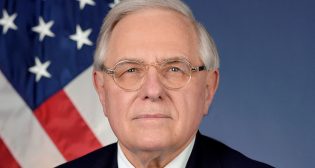
Fuchs Renominated to Second STB Term
Written by Frank N. Wilner, Capitol Hill Contributing Editor
Patrick Fuchs
Republican Patrick J. Fuchs, 35, has been nominated by President Biden to a second term on the Surface Transportation Board (STB), which has economic regulatory authority over railroad rates and practices. His first term expired earlier this month, but the STB’s statute permits members to remain in office an additional 12 months pending Senate confirmation.
Fuchs now awaits a Senate Commerce Committee hearing to determine whether his name goes forward for a Senate-floor confirmation vote. A second term would extend to January 2029. While the Commerce Committee is expected to recommend confirmation, a Senate-floor vote cannot be assured given current election-year politics that are more tempestuous than any in generations.
The more certain path to a confirmation vote, assuming Fuchs is green-lighted by the Senate Commerce Committee, is to be paired with a Democrat and both names be voted in tandem to assure bipartisan support.
Although Democrat and STB Chairperson Martin J. Oberman said last year he would resign his seat this spring, the likelihood of a Democrat being nominated to succeed Oberman and be paired with Fuchs is even more dicey. Senate Republicans will want to keep the Oberman Democratic seat vacant for nomination of a Republican by Donald Trump, should he be elected in November.
Fuchs need not be paired with a STB Democratic nominee, however. There are Democrats already nominated to the National Mediation Board and National Transportation Safety Board awaiting Senate confirmation, and Fuchs also could be paired with a Democratic nominee to a non-transportation related agency.
What is certain is Fuchs’ support for a second term from rail shippers, who have used words as “calm,” “solid,” “transparent” and “seriously thoughtful” to describe him. Railroads, so far silent, are expected to support his confirmation. Rail labor has indicated support for decisions that had Fuchs’ vote.
Notably, Oberman—who is close with fellow-Chicagoan Dick Durbin, the Senate’s highest-ranking leader behind Majority Leader Chuck Schumer—has consistently praised Fuchs’ work ethic, collegiality and understanding of the law and transportation economics.
As a Senate Commerce Committee senior staff member prior to earning his first STB term, Fuchs provided advice on transportation issues to then-Commerce Committee Chairperson John Thune, who holds the second-highest Republican Senate leadership post behind Minority Leader Mitch McConnell.
Fuchs is one of 24 former congressional aides to become a rail regulator—there having so far been 117 members of the STB and its predecessor Interstate Commerce Commission (ICC), dating to 1887.
In his nomination statement, President Biden said that during Fuchs’ first term, he “advanced transportation policies that address unreasonable practices and inadequate service, adjudicated railroad transactions that generated new capital investment and routing options, and streamlined inefficient processes that unduly burden the public.”
Biden recalled that Fuchs, when serving the Senate Commerce Committee, “played an integral role in the development and enactment of significant railroad legislation, including the reform of railroad infrastructure programs and the first reauthorization of the STB” since its 1996 creation—a bill Fuchs had a hand in drafting. For that, Thune complimented Fuchs ahead of his first-term confirmation vote, saying, “Railroads and their customers will benefit from his sense of fairness and his talent.”
In fact, Fuchs helped draft six bills directly affecting freight and passenger railroads. They included the rail and hazardous materials titles of the FAST (Fixing America’s Surface Transportation) Act. That law, the first rail passenger service reauthorization in almost a decade, instituted reforms improving Amtrak’s permitting and performance, encouraging private-sector competition on routes. It also created the CRISI (Consolidated Rail Infrastructure and Safety Improvements) program, drafted by Fuchs, that has been a major source of funding for short line railroads’ capital projects to improve track, reduce grade crossing delays and expand options for shippers.
Fuchs earned a double-major undergraduate degree in economics and political science, and a master’s degree in public policy analysis and management, with an emphasis on transportation policy, economics and statistics, from the University of Wisconsin. As a graduate student, he participated in an international academic program with the National University of Singapore focusing on international policy and economics.
Prior to joining the Senate Commerce Committee Republican staff, Fuchs was a policy analyst with the White House Office of Management and Budget, a State Department Presidential Management Fellow serving in The Hague, Netherlands, and a research assistant at the National Center for Freight and Infrastructure Research and Education.
Expect continued speculation on the Oberman vacancy. Some shippers are quietly promoting for nomination former House Transportation & Infrastructure Committee Chairperson Peter DeFazio (D-Ore.), now retired from Congress.
DeFazio wouldn’t be the first congressional lawmaker to become a rail regulator—but none since 1958. Seven former House members were later nominated and confirmed to the ICC.
DeFazio’s personality likely will work against him, however. Significantly, despite chairing the pivotal House committee initiating transportation legislation, DeFazio was locked out of crucial negotiations on the bipartisan IIJA (Infrastructure Investment and Jobs Act), a priority of the Biden administration.
Upon Oberman’s departure, current Vice Chairperson Karen J. Hedlund—the vice chair chosen annually by sitting Board members—will serve as acting chairperson. By statute, only the President may designate a permanent chairperson from among sitting Board members. Biden could name a new chairperson upon Oberman’s departure, await the confirmation of Oberman’s successor to do so, or leave the permanent chair vacant to be filled in 2025 following November elections. With Democrat Oberman gone, the Board will have two Democrats and two Republicans.
Besides Fuchs and Oberman, other members of the five-person STB include Democrat Hedlund, whose first term expires Dec. 31, 2025; Republican Michelle A. Schultz, whose first term expires Jan. 11, 2026; and Democrat Robert E. Primus, whose second term expires Dec. 31, 2027. The STB’s statute limits members to two terms.
Railway Age Capitol Hill Contributing Editor Frank N. Wilner is a former STB chief of staff and assistant vice president for policy at the Association of American Railroads. His latest book, “Railroads & Economic Regulation,” is available from Simmons-Boardman Books at www.transalert.com, 800-228-9670.)



